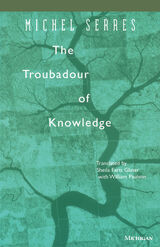2 books about Paulson, William

The Natural Contract
Michel Serres
University of Michigan Press, 1995
Global environmental change, argues Michel Serres, has forced us to reconsider our relationship to nature. In this translation of his influential 1990 book Le Contrat Naturel, Serres calls for a natural contract to be negotiated between Earth and its inhabitants.
World history is often referred to as the story of human conflict. Those struggles that are seen as our history must now include the uncontrolled violence that humanity perpetrates upon the earth, and the uncontrollable menace to human life posed by the earth in reaction to this violence. Just as a social contract once brought order to human relations, Serres believes that we must now sign a "natural contract" with the earth to bring balance and reciprocity to our relations with the planet that gives us life. Our survival depends on the extent to which humans join together and act globally, on an earth now conceived as an entity.
Tracing the ancient beginnings of modernity, Serres examines the origins and possibilities of a natural contract through an extended meditation on the contractual foundations of law and science. By invoking a nonhuman, physical world, Serres asserts, science frees us from the oppressive confines of a purely social existence, but threatens to become a totalitarian order in its own right. The new legislator of the natural contract must bring science and law into balance.
Serres ends his meditation by retelling the story of the natural contract as a series of parables. He sees humanity as a spacecraft that with the help of science and technology has cast off from familiar moorings. In place of the ties that modernity and analytic reason have severed, we find a network of relations both stranger and stronger than any we once knew, binding us to one another and to the world. The philosopher's harrowing and joyous task, Serres tells us, is that of comprehending and experiencing the bonds of violence and love that unite us in our spacewalk to the spaceship Mother Earth.
"Wise, rich and poetic . . . not simply a philosophical study of the Environment, or an ecological questioning of Philosophy . . . Nature is acknowledged as an inside force which breaks [the philosopher's] discourse, and opens it up to a vigilant poetic meditation."--Substance: A Review of Theory and Literary Criticism
World history is often referred to as the story of human conflict. Those struggles that are seen as our history must now include the uncontrolled violence that humanity perpetrates upon the earth, and the uncontrollable menace to human life posed by the earth in reaction to this violence. Just as a social contract once brought order to human relations, Serres believes that we must now sign a "natural contract" with the earth to bring balance and reciprocity to our relations with the planet that gives us life. Our survival depends on the extent to which humans join together and act globally, on an earth now conceived as an entity.
Tracing the ancient beginnings of modernity, Serres examines the origins and possibilities of a natural contract through an extended meditation on the contractual foundations of law and science. By invoking a nonhuman, physical world, Serres asserts, science frees us from the oppressive confines of a purely social existence, but threatens to become a totalitarian order in its own right. The new legislator of the natural contract must bring science and law into balance.
Serres ends his meditation by retelling the story of the natural contract as a series of parables. He sees humanity as a spacecraft that with the help of science and technology has cast off from familiar moorings. In place of the ties that modernity and analytic reason have severed, we find a network of relations both stranger and stronger than any we once knew, binding us to one another and to the world. The philosopher's harrowing and joyous task, Serres tells us, is that of comprehending and experiencing the bonds of violence and love that unite us in our spacewalk to the spaceship Mother Earth.
"Wise, rich and poetic . . . not simply a philosophical study of the Environment, or an ecological questioning of Philosophy . . . Nature is acknowledged as an inside force which breaks [the philosopher's] discourse, and opens it up to a vigilant poetic meditation."--Substance: A Review of Theory and Literary Criticism
[more]

The Troubadour of Knowledge
Michel Serres
University of Michigan Press, 1997
What do we do when we raise a child, teach a student, or educate a person as a member of society? For the French philosopher Michel Serres, all of these forms of pedagogy require painful yet exhilarating departures from home and encounters with Otherness. Like a swimmer who plunges into the river's current to reach the opposite bank, the person who wishes to learn must risk a voyage from the familiar to the strange. True education, Serres writes, takes place in the fluid middle of this crossing. To be educated is to become a harlequin, a crossbreed, a hybrid of our origins--like a newborn child, complexly produced as a mixture of maternal and paternal genes, yet an independent existence, separated from the familiar and determined.
In this wide-ranging meditation on learning and difference, Serres--the scientist turned epistemologist, philosopher turned moralist, reveler of being a half-breed from every point of view--explores numerous pathways in philosophy, science, and literature to argue that the best contemporary education requires knowledge of both science's general truths and literature's singular stories. He heralds a new pedagogy which claims that from the crossbreeding of the humanities and the sciences a new educational ideal can be born: the troubadour of knowledge.
With his agile and poetic voice, Serres has created a meditation of precisely this pluralistic creation, deftly recognizing it as a third party bred not of orderly dialectics but of the destabilizing multiplicity of the present age. Those who know the enormous range and clarity of this thinker will welcome this latest volume translated into English by Sheila Glaser with the assistance of William Paulson.
Michel Serres has taught at Clermont-Ferrand, the University of Paris VIII [Vincennes], the Sorbonne, and Stanford University, and has served as visiting professor at Johns Hopkins University. Other works of his available in English translation include Conversations on Science, Culture, and Time (with Bruno Latour), Genesis, and The Natural Contract, also published by The University of Michigan Press.
Sheila Glaser is Reviews Editor of Artforum magazine. William Paulson is Professor of French and Chair of the Department of Romance Languages and Literatures at the University of Michigan.
[more]
READERS
Browse our collection.
PUBLISHERS
See BiblioVault's publisher services.
STUDENT SERVICES
Files for college accessibility offices.
UChicago Accessibility Resources
home | accessibility | search | about | contact us
BiblioVault ® 2001 - 2024
The University of Chicago Press









